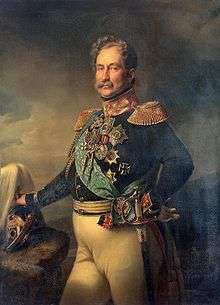Alexey Fyodorovich Orlov
Prince Alexey Fyodorovich Orlov (Russian: Алексе́й Фёдорович Орло́в; 30 October [O.S. 19 October] 1787 – 2 June [O.S. 21 May] 1862) was a Russian diplomat, the natural son of Count Fyodor Grigoryevich Orlov. He was born in Moscow and took part in all the Napoleonic Wars from 1805 to the capture of Paris. For his services as commander of the cavalry regiment of the Horse Life Guards on the occasion of the rebellion of 1825 he was granted a title of count, and in the Turkish War of 1828–1829 rose to the rank of lieutenant-general.
Prince Alexey Fyodorovich Orlov | |
|---|---|
 | |
| Russia Ambassador to Constantinople | |
| Assumed office 1833 |
It is from this time that his diplomatic career of Orlov began. He was the Russian plenipotentiary at the Peace of Adrianople, and in 1833 was appointed Russian ambassador at Constantinople, holding at the same time the post of commander-in-chief of the Black Sea Fleet. He was, indeed, one of the most trusted agents of Nicholas I, whom in 1837 he accompanied on his foreign tour. From 1844 to 1856 he was in charge of the infamous Third Section, or secret police.
In 1854, he was sent to Vienna to bring Austria over to the side of Russia during the Crimean War, but without success. In 1856 he was one of the plenipotentiaries who concluded the Peace of Paris. In the same year he was raised to the dignity of prince, and was appointed president of the Imperial Council of State and of the Council of Ministers. In 1857, during the emperor's absence, he presided over the commission formed to consider the question of the emancipation of the serfs, to which he was altogether hostile. He died in Saint Petersburg.
In popular culture
Orlov was the subject of a satirical verse by Alexander Pushkin, alleging that Orlov's mistress, the dancer Istomina, could see his penis only through a microscope. [1]
References
- Simon Sebag Montefiore, The Romanovs 1613–1918, Weidenfeld & Nicolson 2016, p 327